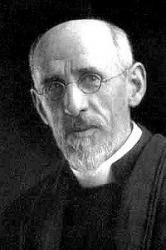Planning worship?
Check out our sister site, ZeteoSearch.org,
for 20+ additional resources related to your search.
- |
User Links
Person Results
T. A. Lacey

1853 - 1931 Person Name: T. A. L. Translator of "Lord of Creation, bow thine ear, O Christ, to hear" in The English Hymnal Lacey, Thomas Alexander, s. of G. F. Lacey, was b. at Nottingham, Dec. 20, 1853. He entered Balliol Coll., Oxford, as an exhibitioner in 1871 (B.A. 1876, M.A. 1885), was ordained D. 1876, P. 1879, was from 1894 to 1903 Vicar of Madingley near Cambridge, and since then has been Chaplain of the London Diocesan Penitentiary. He was one of the Committee who compiled The English Hymnal, 1906, and contributed to it twelve translations (8, 66, 67, 69, 104, 123, 124, 174, 208, 226, 249, 325), also one unpublished and one previously published original, viz.,
1. O Faith of England, taught of old. [Church Defence.]
2. The dying robber raised his aching brow. [Good Friday.] First in the Treasury, Sept. 1905, p. 482, headed "Sursum."
Three other translations by him are noted at pp. 989, i. 1139, ii. [Rev. James Mearns, M.A.]
--John Julian, Dictionary of Hymnology, New Supplement (1907)
T. A. Lacey
Elpis
470 - 500 Author (Ascribed to) of "With gold most precious, and with sanguine hues of morn" in The English Hymnal Elpis, first wife of the celebrated philosopher Boethius, was the daughter of Festus, Consul at Rome, 472, and sister of the mother of St. Placidus, a disciple of St. Benedict. The hymn "Aurea luce et decore roseo" (q. v.) is usually, but somewhat uncertainly, attributed to her. Others also bear her name. She died at an early age, at Padua.
-- John Julian, Dictionary of Hymnology (1907)
==================
Elpis, p. 329, i. Recent researches have led us to conclude that there is no reason to regard Elpis as the author of Aurea luce, p. 93, i.; and that none of the early manuscripts attribute it to her. She is not mentioned as a hymn-writer by recent authorities on early Latin Hymnody, e.g., by Ebert or Manitius (p. 655, i.), or by Rietschel (Herzog-Hauch Healencyklopädie, 1901, xi., pp. 399-409).
The traditional account of her, p. 329, i. (as given in the Elogia Siculorum, 1690, p. 103, of Jerome of Ragusa, and more fully by Darras, Hist. de l’Eglite, 1862, vol. xiv., p. 264, &c), is that she was b. at Messina in Sicily, was the first wife of the philosopher Boethius, shared his exile, and died at Pavia (not Padua) about 493, leaving two sons who became consuls in the year 500. Boethius, however, was born little, if any, earlier than 475, and did not go into exile before 522, being at that time the husband of Rusticiana, whose two sons by Boethius were consuls in the year 522 (Viet. Christ. Biog., i., 321; Ersch and Gruber, Encyklop., I., xi., p. 284, &c.)
[Rev. James Mearns, M.A.]
--John Julian, Dictionary of Hymnology, New Supplement (1907)
Elpis


 My Starred Hymns
My Starred Hymns


